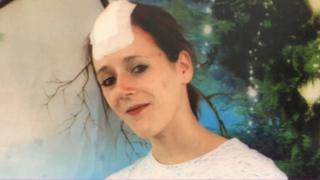‘She was so desperate, she swallowed a toothbrush’

“She is so desperate to end it all, she currently has a toothbrush inside her.”
Jane Haines is talking about her daughter, Ayla, who has been in secure units for people with learning difficulties for seven years.
A government programme to move people out of these units after an abuse scandal is a failure, campaigners say.
The government said in 2015 it was committed to reducing inpatient numbers in England by at least 35%, although it has only relocated 20% so far.
That means 2,000 patients remain in them and the government has extended the original March 2019 deadline to 2020.
‘Brain damage’
Jane’s daughter was admitted to an Assessment and Treatment Unit (ATU) at 19, after struggling with anorexia and other mental health issues.
These secure units treat vulnerable young people who are deemed to be a danger to themselves.
Patients are supposed to be admitted for nine to 18 months, but the average stay is more than five years.
Ayla has spent the past seven years as an inpatient and is currently living in Northamptonshire, more than 200 miles away from her home in Carmarthen.
Jane tells the BBC’s Victoria Derbyshire programme it has led to desperate behaviour, including swallowing a toothbrush, which is still in her body 10 months later.
“She’s got a huge bald patch on her head where her hair will never grow back, from all the head banging she’s done,” she says. “One of the doctors said possibly she’s caused more brain damage.
“We are powerless and have to sit back and watch her suffer,” says Ayla’s grandmother Judy Haines. “It’s torture for her and for us.”
Jane says she is not critical of the place where Ayla is being treated, rather the system.
The ATU where she is staying said it was unable to provide comment on an individual case. But it said it, “works with every individual to design a package of care around them, to keep them safe and help them progress back to the community”.
‘Must be closed’
ATUs came under scrutiny in 2011 after the BBC’s Panorama exposed horrific abuse of patients at Winterbourne View.
The government promised to end their use for those capable of living in the community with proper support through a programme called Transforming Care – which cost £10m.
Dan Scorer, head of policy at Mencap, said: “People are spending many, many years in there, they shouldn’t be. Awful things are happening to people in there and they shouldn’t be.
“And in the same way asylums were closed, these places need to be closed and people need to be supported in the community.”
NHS figures show an increase in staff resorting to medication, seclusion and even restraint when dealing with patients. Of the 2,500 incidents reported in December last year alone, 800 were against children under the age of 18.
Linda and Chris Hutchings’ 27-year-old daughter lives in a secure unit in the East Midlands. She was sectioned, aged 14, after battling with an eating disorder and depression.
Her mum, Linda, says: “I wake up in the middle of the night and I am crying because I am so sad.
“In one of the hospitals [not the one she is currently in] she was locked in one room for nine weeks, and it was so awful for her because there was nothing apart from a telly on a high bracket on the wall.”
Chris says: “Can you even envisage another situation where a human being is locked up on the presumption of guilt? On what they might do to themselves or others? You lose that basic right to be free.”
Birmingham City Council, which is responsible for their daughter’s care, also said it could not comment on individual cases, adding, “there are always safeguarding measures in place when somebody’s liberty is limited due to illness or disability”.
‘Bedlam institutions’
Experts say the average placement cost of keeping one person in an ATU is more than £3,000 per week.
Labour’s shadow care minister, Barbara Keeley, said the government was allowing private companies to make millions, because the ATUs cost five times the amount of a community placement.
“They are like the Bedlam institutions in Victorian times,” she said. “This is a hidden horror. There have been 40 deaths in these units in 2015, nine of those were people under 35.”
She said the government should make a new pledge to close them down.
A Department of Health spokesman said: “We are determined to reduce the number of people on the autism spectrum with learning disabilities in mental health hospitals, and significant investment in community support has already led to a 20% reduction.
“The NHS is committed to reducing inpatient numbers by 35% by 2020.”
But with the right support, some parents say that the government’s transformation care programme can work.
Fauzia Hussain, who has Tourette’s and autism, spent 22 months in a secure unit. Her family says that she was prescribed high doses of medication, including anti-psychotic drugs and kept mostly in segregation.
Since she has left, her life has since been transformed.
“It was a hopeless place. I’m a child psychiatrist and I couldn’t access the right support,” her aunt Shahana says.
“I’m aware of so many families who haven’t been quite so lucky. I live in fear that Fauzia might end up back in a place like that.”
Follow the BBC’s Victoria Derbyshire programme on Facebook and Twitter – and see more of our stories here.

